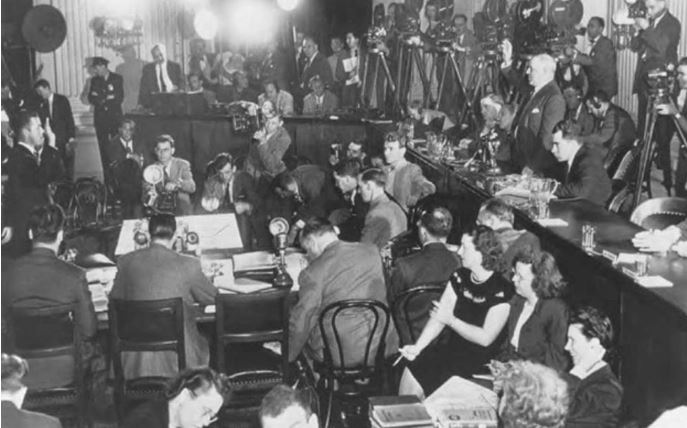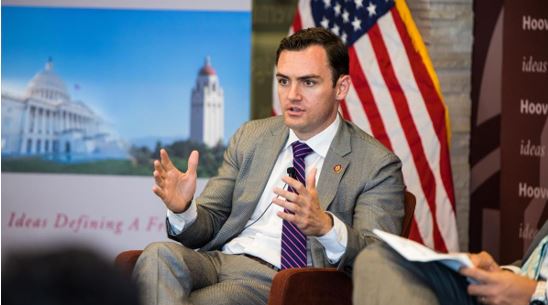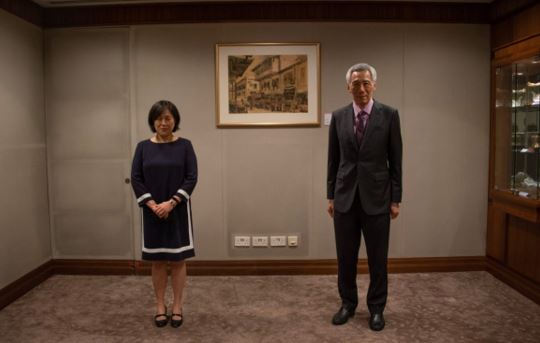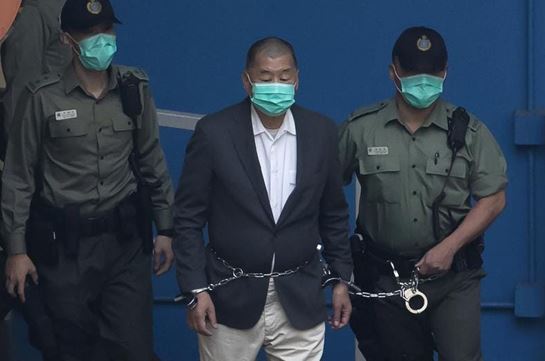|

The House Un-American Activities Committee, which exposed communist activities in America, swears in its members. Future President Richard Nixon seated at left of chairman.
Plenty of politicians have talked tough on China, but Congress might be gearing up to do something about the threat. In one of its first acts, the new Republican-led House of Representatives established a Select Committee on China to focus on the danger to America posed by that country’s communist government.
House Speaker Kevin McCarthy tapped Rep. Mike Gallagher to lead the committee. The 38-year-old Gallagher is only beginning his fourth term in Congress, having first been elected in 2016 to represent northeast Wisconsin.
McCarthy deserves credit for choosing new blood. Gallagher, a former Marine who served two tours in Iraq, is a pragmatic hawk. He never bought the establishment view that China’s government would be docile if the free world only played nice and made China rich through what was falsely sold as “free trade.”
The new energy is overdue in Congress. The tougher measures the Trump administration used against China, especially tariffs on most imported goods and export controls to deny U.S. technology to Beijing, had to be enacted by Donald Trump and his Cabinet directly through executive action, as Congress would not have passed them through legislation.
While Congress continues to appropriate record amounts of money for national defense, it has not insisted on increasing our military deterrence in the Pacific, where the Chinese can observe a declining number of U.S. ships, planes, and other capabilities as we devote attention elsewhere.
Worst of all, those who want to do business with China still hold considerable sway. Wall Street and Big Tech have yet to fully grasp that China is a dangerous adversary bent on displacing the United States—including U.S. business—while forcing the world to follow its model of high-tech tyranny. U.S. universities are still drunk on Chinese money, both though direct funding from Chinese organizations and tuition from elite Chinese. Hollywood still censors media that would upset the Chinese government. Our trade deficit with China means we still pump hundreds of billions of dollars into that economy each year.
The new committee should spotlight all of these lapses and urge the logical next step of strategically decoupling the U.S. economy from China’s while giving our allies a clear and preferable alternative bloc with which to associate.

Rep. Mike Gallagher, first elected in 2016, chairs the new committee.
First, the new committee can start simply by holding effective hearings. When was the last time the public paid much attention to anything going on in Congress other than an impeachment or a Supreme Court confirmation fight? Most other hearings feature bland bureaucrats, partisan nuts, or academics from stale Washington think tanks. No one watches.
Instead, the new committee can take hearings on the road to hear from companies and people who have been victimized by Beijing, and to put an unpleasant spotlight on those who still prefer collaboration. Hearings in Hollywood, Silicon Valley, and on Wall Street would bring the China issue alive for the American people, and could spur the rest of Congress to action.
Second, the committee should go to American bases in the Pacific like those in San Diego, Honolulu, Guam, and Okinawa to see just how unprepared allied militaries are for a fight with China—which actually makes the fight more tempting for Beijing to start. It should also go to Taiwan and explore how that nation can be seen as an asset in our struggle with China rather than a liability, especially since Taiwan demonstrates that democracy can work better than communism for ethnically Chinese cultures.
Third, the committee could explore economic options to give East Asian countries an alternative to a China-dominated bloc. Southeast Asia in particular needs U.S. engagement so that China is not the sole economic power. President Joe Biden’s Indo-Pacific Economic Framework is a nothing-burger, which will produce little more than platitudes about climate change, sustainability, and the supply chain. The remnant of the Trans-Pacific Partnership, from which Trump withdrew the United States, is also moribund since it would export manufacturing from America to developing nations. Instead, the committee can broach new ideas like a mechanism to provide cover for free-market capitalist reforms with the goal of recreating the 2017-2019 U.S. economic boom here and elsewhere.

Singapore Prime Minister Lee humors U.S. Trade Representative Katherine Tai as she promotes the nothing burger of Indo-Pacific Economic Framework.
Fourth, the committee can restore human rights to the role it had in foreign policy when Ronald Reagan was president. Reagan spotlighted dissidents in the Soviet Union because doing so personified the evil and aggression of our chief opponent at the time and reminded people that the American model was better.
Today, some of our elite seem to think human rights is about flying rainbow flags over our embassies and hectoring governments that aren’t like us—a counterproductive form of cultural imperialism. Trump also dropped the ball on elevating high-level dissidents, seeming to care little about them and leaving then-Vice President Mike Pence and Secretary of State Mike Pompeo to pick up the ball.
The new committee could reset the issue on a bipartisan basis by amplifying the plight of political prisoners like Jimmy Lai, perhaps the world’s most famous Catholic layman, whom China has in a Hong Kong prison on phony charges for running a pro-democracy newspaper. Other brave Chinese dissidents also deserve attention. Both parties in Washington should be able to agree on illuminating the nature of China’s government and the wicked things it does to retain its power.
 Jimmy Lai: In prison for running a pro-democracy newspaper. He could easily have fled and lived lavishly anywhere, but decided to stay with his people. Gallagher and his colleagues seem prepared to join this fight, and have the support of McCarthy. (Success would make Gallagher a logical, new blood choice for Secretary of State or Defense in the next Republican administration.)
Done right, the new committee could mark a turning point in Washington. It could begin finally to unite the government around stopping China’s extensive influence operations in the United States and using America’s combined economic, cultural, and military power to put the Chinese Communist Party on the defensive globally.
Christian Whiton was a State Department senior advisor in the George W. Bush and Donald Trump administrations. He is a senior fellow at the Center for the National Interest.
(originally published at Super Marco.)
|